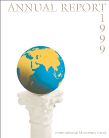
Annual Report of the Executive Board
Annual Report
of the Executive Board for the
Financial Year Ended April 30, 1999
September 1999
[$token_name="PublicationDisclaimer"]
WASHINGTON, D.C.
| CONTENTS | |
| File 1 422k Adobe Acrobat pdf file |
Letter of Transmittal |
| Executive Board and Senior Officers | |
| Board of Governors, Executive Board, Interim Committee, and Development Committee | |
| Prefatory Notes | |
| File 2 157k Adobe Acrobat pdf file | I. Overview |
| Financial Crises Prompt Consideration of Proposals to Strengthen the Global Financial System | |
| II. The Global Economy | |
Emerging Market Economies Advanced Economies | |
United States, Japan, and Europe Crisis-Afflicted Economies Other Emerging Economies Preventing Contagion | |
Annual Review Asian Crisis and Other Emerging Market Developments Mature Market Countries Interim Review Factors Behind Markets' Response Role of Public Policy | |
| File 3 178k Adobe Acrobat pdf file | III. The IMF in 1998/99 |
IMF-Supported Programs in Asian Crisis Countries The Board's Assessment Russia and Brazil | |
Transparency, Standards, and Surveillance Improving Transparency and Accountability of the IMF and Member Countries Developing Standards for Use by Members Role of Standards in IMF Surveillance Strengthening Financial Systems Capital Account Issues Involving the Private Sector in Forestalling and Resolving Crises Intensifying Efforts at Preventing Crises Measures to Facilitate Private Sector Involvement Systemic Issues Implications of Capital Mobility and Exchange Rate Volatility Developing IMF Facilities Strengthening IMF Resources Institutional Reform and Strengthening or Transforming the Interim Committee | |
Bilateral Surveillance Global and Regional Surveillance European Economic and Monetary Union West African Economic and Monetary Union Experience of Transition Economies | |
| File 4 212k Adobe Acrobat pdf file |
Supplemental Reserve Facility and Contingent Credit Lines Assistance to Postconflict Countries Postconflict Countries with Arrears to International Institutions Access Policy and Limits Staff-Monitored Programs Social Issues Economic Impact of the Kosovo Crisis Member Countries' Use of IMF Facilities Albania Armenia Azerbaijan Bangladesh Benin Bolivia Bosnia and Herzegovina Brazil Bulgaria Burkina Faso Cameroon Central African Republic Republic of Congo Djibouti Dominican Republic El Salvador Ethiopia The Gambia Georgia Guyana Haiti Honduras Jordan Kyrgyz Republic Former Yugoslav Republic of Macedonia Malawi Mali Mozambique Niger Pakistan Russia Rwanda St. Kitts and Nevis Sierra Leone Tajikistan Tanzania Uganda Ukraine Uruguay Republic of Yemen Zambia Zimbabwe |
HIPC Initiative Progress in Implementation Options for Enhancing the HIPC Initiative Distilling Lessons from ESAF Evaluations Design of ESAF-Supported Programs Implementation of ESAF-Supported Programs Social Policies in ESAF-Supported Programs IMF World Bank Collaboration Monitoring ESAF-Supported Programs Financing the ESAF and the HIPC Initiative | |
| |
| File 5 195k Adobe Acrobat pdf file |
Membership and Quotas IMF Liquidity and Borrowing General Resources Borrowing Access Policy and Limits on Use of IMF Resources Members' Use of IMF Resources and Credit Outstanding Stand-By and Extended Arrangements Special Facilities SAF and ESAF ESAF-HIPC Trust IMF Income, Charges, and Burden Sharing Overdue Financial Obligations Progress Under the Strengthened Cooperative Strategy SDR Department SDR Valuation and Interest Rate Basket SDR Operations and Transactions Pattern of SDR Holdings |
| IV. IMF Organization, Staffing, and Budget | |
Executive Board Departments Area Departments Functional and Special Services Departments Information and Liaison Support Services Staff Recruitment and Retention Salary Structure Diversity Administrative and Capital Budgets Budget Outlook Budgets and Expenditure in 1998/99 Budgets and Expenditure in 1999/2000 | |
| File 6 226k Adobe Acrobat pdf file | Appendices
|
| File 7 287k Adobe Acrobat pdf file |
|


